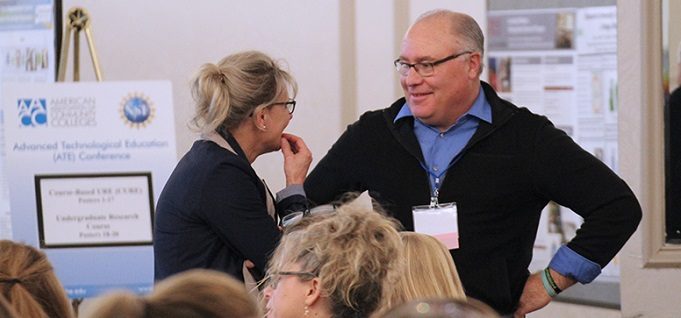Diving in student research experiences
By Madeline Patton
December 4, 2019
The Community College Undergraduate Research Experience (URE) Summit brought together students, educators and more to discuss how community colleges can develop UREs in STEM education and workforce preparation.
Four community college students opened the Community College Undergraduate Research Experience (URE) Summit by explaining their different but similarly powerful research experiences. They also offered this advice to community college educators: Involve students in research — they will thank you for it.
“Students are hungry to learn beyond the bounds of the classroom,” said Paula Kirya, a bioengineering student at Pasadena City College in California who has done research on the nanostructures of butterfly wings. She advised 130 thought leaders attending the summit in Washington, D.C., to let more community college students know about opportunities to pursue research questions, do internships, participate in competitions and attend conferences.
“It’s really exciting to have all these options to pick from,” Kirya said.
Professors’ outreach
During the panel discussion, each of the students described how various learning experiences and career opportunities opened to them as a result of a community college professor inviting them to become involved in either a competition, research project or internship.
Danial Nasr Azadani talked enthusiastically about the Community College Innovation Challenge (CCIC) that his team won in 2017.
“It was the most phenomenal thing that I was part of,” Nasr Azadani said. “It really made you revolutionize the way you think about research.”
He explained that gaining entrepreneurship and personal skills at CCIC’s boot camp was even more powerful than presenting research at conferences, which he has done multiple times as a result of biotech research he did while attending Del Mar College in Texas.
In 2020 the American Association of Community Colleges (AACC) will again offer the Community College Innovation Challenge with support from the National Science Foundation (NSF). AACC will post the application for teams on its website in January. Ten semi-finalist teams will participate in an entrepreneurship boot camp to learn how to transform their research into products.
The right culture
At Thursday morning’s plenary session, James Hewlett shared the results of a Community College Undergraduate Research Initiative (CCURI) study that looked at how campus cultures impact the success of undergraduate research initiatives. Hewlett is executive director of CCURI, which is based at Finger Lakes Community College in New York.
With support from multiple NSF grants since 2005, CCURI has established a network of more than 120 two-year colleges that use of undergraduate research as a teaching methodology in multiple disciplines. More than 80 percent of CCURI colleges offer research experiences as part of courses.
Aligning undergraduate research with the strategic plan of the college is the most important factor for sustainability, Hewlett said.
Another important finding is that the most successful experiences for students occur when colleges scaffold research opportunities across multiple courses.
“It is not a one-off,” Hewlett said. “They are getting their research experiences in pieces that are connected across the college.”
A ‘think tank’ approach
AACC convened the three-day Community College URE Summit with NSF support. Using a “think tank” approach, community college and university educators, students, government officials and representatives of nonprofit organizations shared their ideas on how community colleges can build, implement and sustain UREs in STEM education and workforce preparation.
“We are enthusiastic to learn about how your institutions are using UREs to help attract, retain and prepare students for the workforce,” said Mary Heiss, senior vice president of academic and student affairs at AACC.
Celeste Carter, director of the Advanced Technological Education program at NSF, said the planning committee intentionally structured the summit to leverage the knowledge and expertise of community college educators. In addition to sharing their insights in a report, Carter expressed the hope that the summit will advance student success in other ways.
“I think it’s an amazing chance for all of us to develop more networks, more partnerships through this summit — Talk about what’s working; challenges we’ve overcome; where we’d like to see this going in the future. I was just really, really happy that people were willing to create as broad a definition of undergraduate research experiences as we have,” she said.
There’s more to the story! Read the full article in CC Daily.



